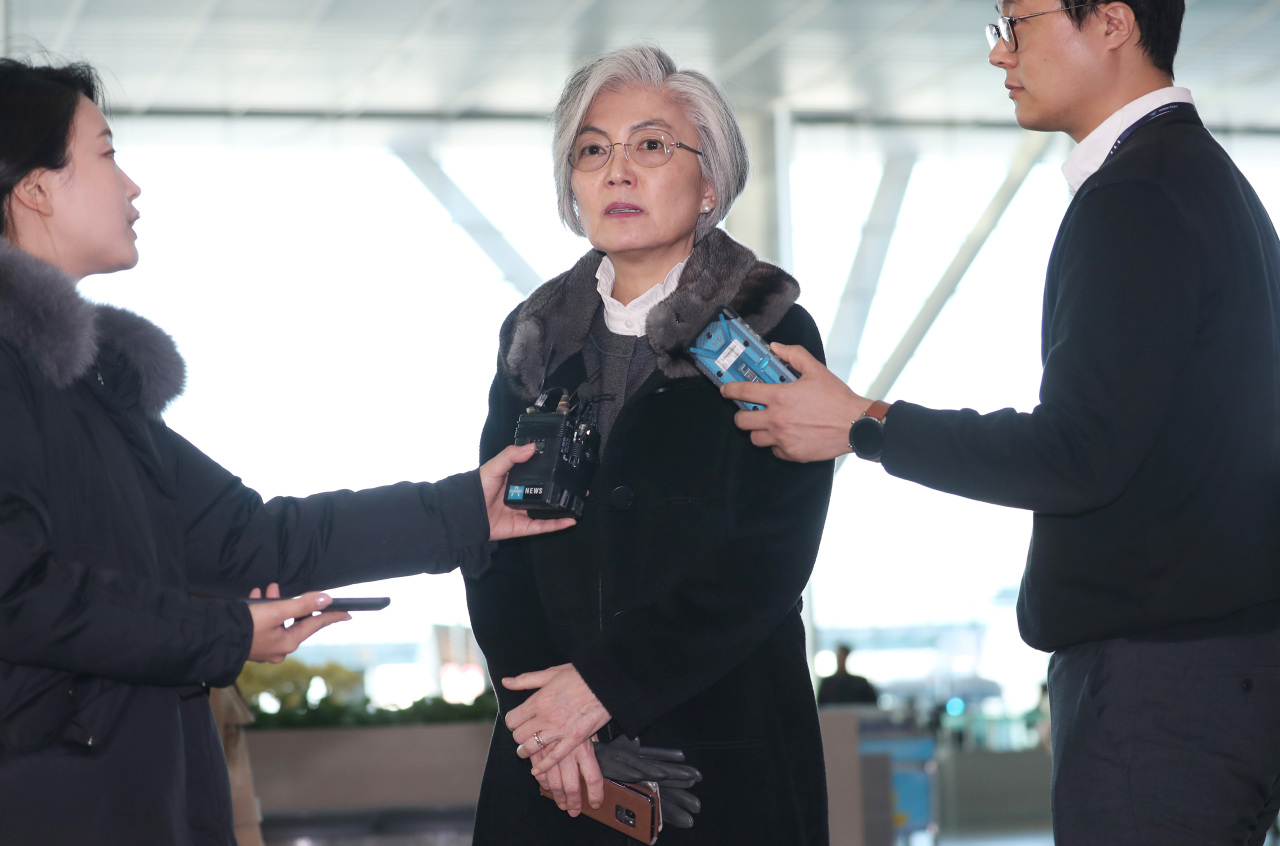South Korea’s Foreign Minister Kang Kyung-wha left for the US on Monday to discuss outstanding issues between the two allies, including the possibility of dispatching troops to the Middle East and stalled denuclearization talks with North Korea.
Kang is set to meet US Secretary of State Mike Pompeo in San Francisco on Tuesday (US time), nine months after their last talks in Washington in March. She is also expected to meet Japanese Foreign Minister Toshimitsu Motegi, who is visiting San Francisco as well, for bilateral talks or a trilateral meeting with Pompeo, though the arrangements have not been finalized.
“The government is reviewing (the possibility of sending troops to Strait of Hormuz),” she told reporters at Incheon International Airport before boarding her flight. “I will listen to the US’ thoughts on the issue, and the conversation will serve as a reference (for the government’s decision).”
She added that there were many things to discuss with Pompeo. “There will be an extensive consultation on the matter of North Korea, pending bilateral issues and the current situation in the Middle East.”
 |
South Korea`s Foreign Minister Kang Kyung-wha answers questions by the reporters at Incheon International Airport on Monday, before heading to US. (Yonhap) |
Her meeting with Pompeo takes place at a crucial time. Washington has ramped up calls for its allies, including South Korea, to send troops to safeguard the US-led maritime force in the Strait of Hormuz off the Iranian coast, amid the rising tension between the US and Iran following the US killing of Iran’s top military commander, Gen. Qassem Soleimani.
Seoul has been mulling whether to send troops to the region. There has been speculation that the Navy’s anti-piracy Cheonghae Unit, currently stationed in the Gulf of Aden, could relocate to the Strait of Hormuz, instead of new troops being sent.
The Strait of Hormuz, the world’s largest oil chokepoint, is a critical region for Seoul, as 70 percent of oil imports to South Korea pass through the area. But Seoul is faced with the conundrum of responding to a request from its key ally while maintaining its long-standing economic ties with Iran, which has warned of a negative impact on Seoul-Tehran ties if Seoul dispatches troops.
Pompeo is expected to request the deployment of troops during the meeting, critics say, but Kang has maintained a cautious approach on the matter.
“I think the US position and ours may not necessarily be the same when it comes to our analysis of the situation and considering our bilateral relationships with the countries in the Middle East,” Kang told lawmakers last week.
The two top diplomats are also planning to discuss how to denuclearize North Korea, amid stalled nuclear negotiations and Pyongyang’s provocative rhetoric.
Following the collapse of nuclear talks between the US and North Korea in Hanoi, Vietnam, in February, there has been no progress on denuclearization, as the two sides refuse to budge on differences over UN-led sanctions that have crippled the North’s economy.
On Saturday, North Korea’s Foreign Ministry adviser Kim Kye-gwan reiterated the country’s frustration toward stalled negotiations with the US, stressing that Pyongyang would never engage in talks to fully abolish its nuclear capabilities in return for ending US-led sanctions, like it did in Vietnam.
The talks will reopen only under the condition of Washington’s “absolute agreement” on Pyongyang’s demands, he added.
In signs of some progress, US national security adviser Robert O’Brien said the Trump administration has recently asked the North to resume talks.
“We’ve reached out to the North Koreans and let them know that we would like to continue the negotiations in Stockholm that were last undertaken in early October,” O’Brien told Axios in an interview earlier Monday. “We’ve been letting them know, through various channels, that we would like to get those (negotiations) back on track and to implement Chairman Kim’s commitment to denuclearization of the Korean Peninsula.”
“At this point, I think it’s important to note that there have been no additional provocations by the North,” Kang said. “We will continue to discuss this not only at a ministerial level, but also at a directorial level.”
South Korea’s chief nuclear envoy, Lee Do-hoon, is expected to meet his US counterpart, Stephen Biegun, sometime this month as well.
During the talks in San Francisco, the thorny issue of defense cost-sharing for the US military presence in South Korea is expected to be discussed as well.
The two sides have been holding talks to strike a deal since last year, but they have failed to agree on the cost of housing some 28,500 US troops here. The US initially demanded a fivefold increase in South Korea’s share of the expenses, to nearly $5 billion.
Seoul’s chief negotiator Jeong Eun-bo on Monday left for Washington for another round of talks with his US counterpart, James DeHart, set to run through Wednesday. Before he left, he said they have made progress “to some extent.”
By Ahn Sung-mi (
sahn@heraldcorp.com)




![[Herald Interview] 'Trump will use tariffs as first line of defense for American manufacturing'](http://res.heraldm.com/phpwas/restmb_idxmake.php?idx=644&simg=/content/image/2024/11/26/20241126050017_0.jpg)

![[Health and care] Getting cancer young: Why cancer isn’t just an older person’s battle](http://res.heraldm.com/phpwas/restmb_idxmake.php?idx=644&simg=/content/image/2024/11/26/20241126050043_0.jpg)

